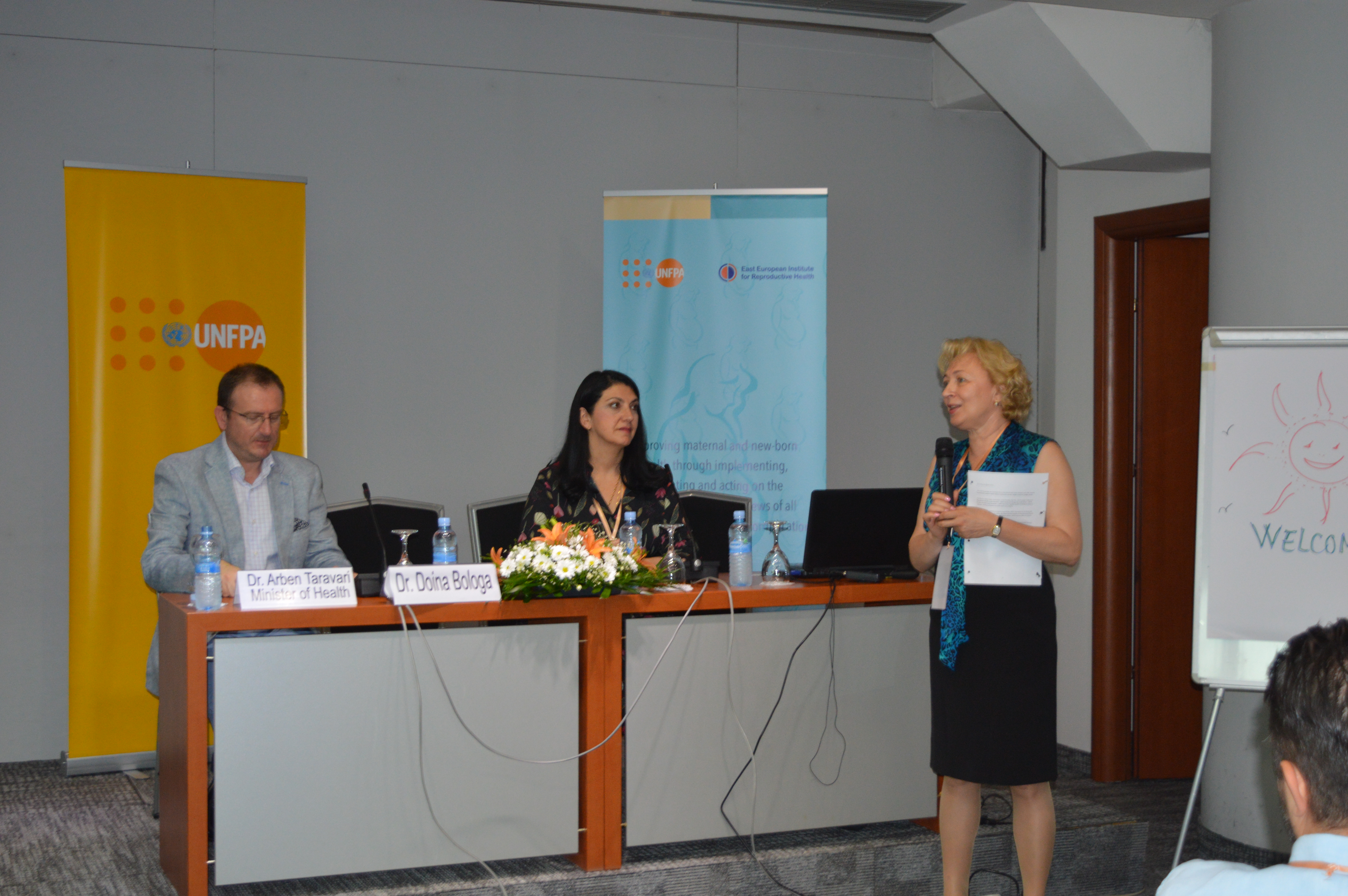 Towards Better Maternal Health Outcomes: Making Pregnancy Safer
Maternal health training by the East European Institute for Reproductive Health in the Balkan region
Towards Better Maternal Health Outcomes: Making Pregnancy Safer
Maternal health training by the East European Institute for Reproductive Health in the Balkan region

Challenges
The countries/territories in the Balkans faced common challenges related to the health of mothers and babies. Moreover, even though the rate of women dying from pregnancy or childbirth-related conditions had nearly halved in the region since 1990, the numbers were still unacceptably high. Much remained to be done if the health care that pregnant women and new mothers currently receive was to improve. Most of these deaths could be averted with basic and effective low-cost interventions, even where resources were limited and even more important if there was an understanding of why they happened and how they could be prevented.
Countries in the region recognized the importance of strengthening the capacity of health professionals, health care planners and managers working in the area of maternal and newborn health in order to improve the quality of care provided. Sharing of knowledge, including better understanding of maternal deaths and complications, between and among countries in the region was important to achieving better maternal health outcomes.
Towards a Solution
UNFPA, in collaboration with World Health Organization (WHO) and the Regional Development Center on Public Health Services in the former Yugoslav Republic of Macedonia, organized an inter-country workshop on maternal mortality and morbidity with focus on the principles and methodology espoused in the WHO guidance document, “Beyond the numbers: Reviewing maternal deaths and complications to make pregnancy safer.” Eight countries and territories participated in this initiative: Albania, Armenia, Azerbaijan, Bosnia and Herzegovina, Georgia, Serbia, the former Yugoslav Republic of Macedonia and Kosovo.
Based on the outcome of the workshop, UNFPA, in partnership with the East European Institute for Reproductive Health in Romania, embarked on an initiative to roll out the maternal death review exercise in the region. The objectives of the initiative were to develop a training curriculum and a training package on reviewing maternal deaths and complications, to conduct a training course for trainers and to assess the quality of maternal care mechanisms, implementation and clinical audits.
Results
Health care participants in the training of trainers course benefited from the lectures, exchange and sharing of knowledge specifically on methods in conducting an in-depth and systematic review of various cases of maternal death and complications, severe maternal morbidity and “near misses,” the use of clinical guidelines and audits to improve quality of care.
The countries/territories in the Balkans recognize that much remains to be done if the health care that pregnant women and new mothers currently receive is to improve. Strengthening the capacity of and empowering health care professionals, especially those working in the area of maternal and newborn health, is an important step in the right direction. With the traditional system of audit of maternal deaths often not based on evidence in most countries in the region, there is a growing and concerted effort to undertake evaluation of current practices through evidence-based professional case reviews to improve the quality of maternal health.
Through lessons learned in the implementation of principles and practice of making pregnancy safer, countries have a deeper appreciation of the need to improve emergency care, national clinical guidelines on major obstetric complications, use of updated standards and facility-based protocols, teamwork around childbirth, as well as enhancing the role of midwives.
This transferable initiative contributes to the implementation of the United Nations Secretary-General’s “Global Strategy for Women’s, Children’s and Adolescents’ Health” in support of the Sustainable Development Goals framework, to the WHO Regional Office for Europe “Action Plan for Sexual and Reproductive Health: Towards Achieving the 2030 Agenda for Sustainable Development in Europe – Leaving No One Behind” and to the implementation of the new Antenatal Care Guidelines.
Lessons Learned
Maternal mortality is a common indicator on the status of women and their access to health care, and the adequacy of the health care system in responding to their needs. However, knowing the precise level of maternal mortality is not enough. Diagnostic tools that can shed light on the causes of maternal mortality and how it can be averted are important.
Contact Information
Countries involved
Supported by
Implementing Entities
Project Status
Project Period
Primary SDG
Secondary SDGs
Similar Solutions
| NAME OF SOLUTION | Countries | SDG | Project Status | |
|---|---|---|---|---|
A Billion Brains: Smarter Children, Healthier Economies High Level Meeting on South-South Cooperation for Child Rights |
Albania, Armenia, Azerbaijan, Bosnia and Herzegovina, Georgia, Kosovo, North Macedonia, Romania, Serbia | 17 - Partnerships for the Goals | Completed | View Details |
Accelerating the Implementation of African Union Treaties in São Tomé and Príncipe South-South learning from the Beninese judicial system’s experience in the application of human rights treaties to its national law |
Albania, Armenia, Azerbaijan, Bosnia and Herzegovina, Georgia, Kosovo, North Macedonia, Romania, Serbia | 05 - Gender Equality | Completed | View Details |
Accelerating the Transformational Shift to a Low-Carbon Economy in Mauritius Towards supplying 35 percent of the country’s energy needs with renewables by 2025 |
Albania, Armenia, Azerbaijan, Bosnia and Herzegovina, Georgia, Kosovo, North Macedonia, Romania, Serbia | 05 - Gender Equality 09 - Industry, Innovation and Infrastructure 13 - Climate Action | Ongoing | View Details |
Access to Justice through e-Services and Dematerialized Case Management Scaling up connectivity and unlocking the digital potential of judicial institutions to enhance access to justice for all |
Albania, Armenia, Azerbaijan, Bosnia and Herzegovina, Georgia, Kosovo, North Macedonia, Romania, Serbia | 05 - Gender Equality | Completed | View Details |
ACP Business-friendly Supporting business-friendly and inclusive national and regional policies, and strengthening productive capabilities and value chains |
Albania, Armenia, Azerbaijan, Bosnia and Herzegovina, Georgia, Kosovo, North Macedonia, Romania, Serbia | 08 - Decent Work and Economic Growth 17 - Partnerships for the Goals | Ongoing | View Details |
